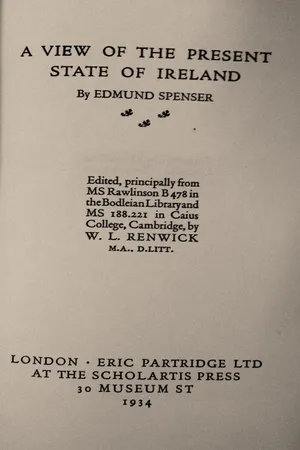
- English
- ePUB (mobile friendly)
- Available on iOS & Android
A View of the Present State of Ireland
About this book
Edmund Spenser (c. 1552-1599) was an important English poet best known for The Faerie Queene (1590, 1596), an epic poem celebrating, through fantastical allegory, the Tudor dynasty and Elizabeth I. He is recognized as one of the premier craftsmen of Modern English verse in its infancy.
In 1569, when Spenser was about 16 years old, his English versions of poems by the 16th-century French poet Joachim du Bellay and his translation of a French version of a poem by the Italian poet Petrarch appeared at the beginning of an anti-Catholic prose tract, A Theatre for Voluptuous Worldlings; they were no doubt commissioned by its chief author, the wealthy Flemish expatriate Jan Baptista van der Noot.
From May 1569 Spenser was a student in Pembroke Hall (now Pembroke College) of the University of Cambridge, where, along with perhaps a quarter of the students, he was classed as a sizar—a student who, out of financial necessity, performed various menial or semi-menial duties. He received a Bachelor of Arts degree in 1573. Because of an epidemic, Spenser left Cambridge in 1574, but he received the Master of Arts degree in 1576.
His best-known friend at Cambridge was the slightly older Gabriel Harvey, a fellow of Pembroke, who was learned, witty, and enthusiastic for ancient and modern literature but also pedantic, devious, and ambitious. There is no reason to believe that Spenser shared the most distasteful of these qualities, but, in the atmosphere of social mobility and among the new aristocracy of Tudor England, it is not surprising that he hoped for preferment to higher position.
Frequently asked questions
- Essential is ideal for learners and professionals who enjoy exploring a wide range of subjects. Access the Essential Library with 800,000+ trusted titles and best-sellers across business, personal growth, and the humanities. Includes unlimited reading time and Standard Read Aloud voice.
- Complete: Perfect for advanced learners and researchers needing full, unrestricted access. Unlock 1.4M+ books across hundreds of subjects, including academic and specialized titles. The Complete Plan also includes advanced features like Premium Read Aloud and Research Assistant.
Please note we cannot support devices running on iOS 13 and Android 7 or earlier. Learn more about using the app.
Information
Table of contents
- Introduction